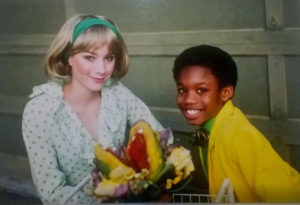In my journalistic journey entitled “Let There Be Light,” I have introduced you to some wonderful teachers who, through their love of the theatrical arts, have found eager, youthful recipients to join with them on their important journey of self-discovery and of self-awareness. Financial icon, Warren Buffett, pointed out on one occasion that, “Someone is sitting in the shade today because someone planted the tree a long time ago.” In other words, because someone, somewhere, planted a seed, be it in the ground or be it in a receptive mind, today we, or she, or they, will reap the benefit.
This month I’m going to introduce you to a brilliant young actor, Dave J. Abrams (now age 27), an actor, dancer, and multifaceted performer, who, when he was only six years old, followed his uncle, Martin, to a children’s theater rehearsal and took full advantage of that opportunity. While in the dressing room with his uncle, Mr. Belasco—the founder and artistic director of the Belasco Theater Company—was told that this youngster loved to dance and sing. Belasco asked him to give an impromptu performance, which the young Abrams did, and he impressed Belasco so much that he turned to costumer Sandra Gardner and asked her if she had a suit that would fit this young man. She responded that she definitely could find something, and in the very next show, dressed to the hilt, this young man walked across the stage holding the hand of another actor, and that is where this wonderful journey began.
Almost everyone in the world is familiar with Lin-Manuel Miranda’s unparalleled musical sensation, Hamilton, but not too many are aware that while he was in college he wrote another musical about life in the Washington Heights neighborhood of New York. In June of this past year, I traveled to El Cerrito, California, to review the Contra Costa Civic Theater’s production of Miranda’s first musical, “In the Heights.” As the show came to the intermission, I reopened the program and specifically looked up the bio of the actor who played “Benny” in that production, as he was exceptional in every aspect of his performance. To my surprise, I discovered that Abrams was the same young actor that I had given great praise to 13 years earlier when, at age 12, he performed the lead role of J. Pierpont Finch in Eddie Belasco’s children’s theater production of “How to Succeed in Business Without Even Trying” in the Del Valle Theater in Walnut Creek in 2004. Further research through my old reviews, revealed that I had even given him praise for his performance as “Oliver,” with Katie Wilhelm as Nancy, at the Lesher Center, when he was only nine years old.
I quickly surmised, here is someone I needed to follow and follow closely. Mr. Abrams also popped up in Fantasy Forum’s “The Greatest Gift” where he played the Jack-in-the-Box in Fantasy Forum’s Lesher Center production. Two months after the Fantasy Forum show, he took on the role of Eddie Souther in the musical “Sister Act” in the Berkeley Playhouse Theater on College Avenue in Berkeley. That show was equally exciting and enjoyable. But that’s not the end of this actor’s aggressive and staggering dedication to build a resume that was bound to garner notice, so once again, within the past five months, I discovered that he was going to be in another musical by the name of “Ragtime.” And once again, Abrams portrays a lead character, now in the demanding role of Coalhouse Walker, an African-American Harlem musician. 
The question foremost in my mind: Is this arduous schedule paying off, and how much of a toll is this pace taking on him? Well, in October of 2017, Dave Abrams received the coveted Theater Bay Area (TBA) award for Outstanding Male Actor in a Featured Role in a Musical for his performance in June of last year for In the Heights at Contra Costa Civic Theater.
In an interview, he admitted that the pressures commensurate with having to perform in production after production with little or no compensation, is difficult; mentally, physically, and economically. He finds himself trying to justify the sacrifices he has endured towards accomplishing his goal, to become an equity actor. If it were not for the kindness and support of family and many friends, many actors working as arduously as Mr. Abrams could not, and would not succeed!
In large part, Abrams was very fortunate to meet a children’s theater producer like Eddie Belasco, and Mr. Belasco’s incredible support staff including Lafayette pediatrician Dr. Samuel Lewis (his principal fundraiser), costumer Sandra Gardner, choreographer Lawrence Peck, musical arranger James Michael, and many others who volunteered their heartfelt time and energy for the benefit of this young man’s dreams and many other young dreamers their ambitions. Dr. Lewis has been a fundraising and promotional super star in this miniature theatrical hemisphere. He created an outreach program wherein he raised thousands of dollars by asking fellow professionals; doctors, lawyers, business owners, corporate sponsors and more, to donate significant dollar amounts which he in turn used to buy blocks of tickets that were then given away free to schools and their students so that these young people could see this type of musical theater designed primarily for them.
Dr. Lewis asked only one thing of these children, that after they saw the show, they were required to respond in writing to the company telling what they liked and what they didn’t like about the production. Early in this process he received a letter from one of the young students, Matthew Martin from Oakland. The letter thanked the doctor for providing a ticket so that he could see the Frank Loesser’s musical, Guys and Dolls, which he praised, except, on three different occasions in that same letter, he questioned, “Where were the black people?” The last time he mentioned it, the question was emphatically printed in big, bold, black print, reinforcing his disdain that there were no black actors in the show.
It was because of this insistent young man that the Belasco Theater Company expanded its productions into the Oakland unified school district and produced shows such as The Wiz, that were entirely cast with young black actors. Finally, it is largely because of Dr. Lewis that Abrams, whose family had extremely limited funds, was able to keep his dream alive. Now the question is: has he indeed found a way keep his dream on track?
There are many opportunities for us to support the arts in our communities; by attending local theatrical productions, volunteering to serve in community theaters, donating generously, and by encouraging your friends and neighbors and clubs to find ways to help these young dreamers in our own communities.
In our communities there are literally hundreds of stories of people’s lives having been made better through a better understanding of what the arts can contribute to our lives.
Leave a Reply